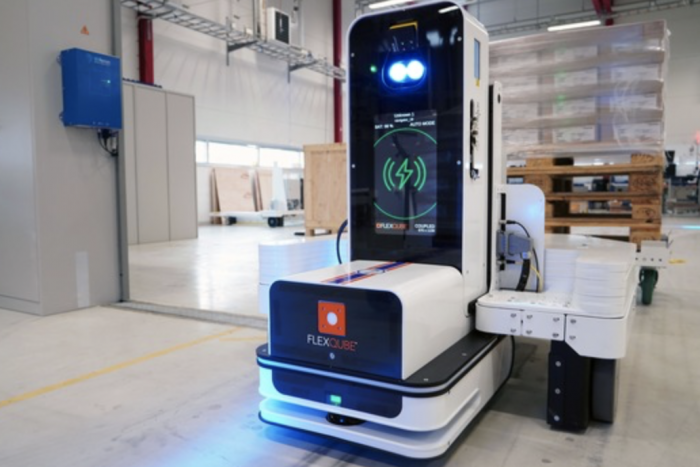In Sync with Production: Daimler Trucks Relies on Contactless Charging with Wiferion

At Daimler Trucks Mexico, a contactless charging infrastructure is enabling a new level of production automation.
In collaboration with FlexQube, PohlCon, and Wiferion, the commercial vehicle manufacturer has implemented a wireless energy supply concept for autonomous mobile robots (AMRs) — fully integrated into the assembly line.
FlexQube’s autonomous kit-delivery fleet transports materials in Daimler’s Mexican production facility from the picking area to the engine-transmission line — covering a distance of around 250 meters. The key to success: the robots are not charged at separate stations as usual, but directly during the assembly process. At two handover points, the vehicles stop for 3 to 4 minutes — precisely this time is now used to inductively charge the batteries.
Floor-integrated solution: safe, maintenance-free, and space-saving
At the heart of the system is the Wireless Charging Protection System (WCPS) from PohlCon. Combined with Wiferion’s inductive charging technology, it is installed directly in the floor — at defined stopping points for the robots. The charging process starts fully automatically as soon as a robot stops over the charging pad. The contactless energy transfer is wear-free, low-maintenance, and poses no risk to employees. The charging surfaces are flat, walkable, and do not obstruct people or machines.
“Our goal was to provide energy exactly where it’s needed in the process — without detours and without additional infrastructure,” says Dennis Thiele, Team Lead Wireless Charging Infrastructure at PohlCon GmbH. “The WCPS makes this possible: it’s safe, efficient, and fully integrable into the production environment.”
Maximum availability — without compromise
Thanks to the solution, the FlexQube fleet remains operational around the clock — with no downtime due to energy shortages. The wireless energy supply occurs precisely where the process already requires a brief stop. This creates a continuous production flow that increases both efficiency and safety on the shop floor. At the same time, the need for separate charging zones is eliminated — freeing up valuable space for other production steps.
“With in-process charging, we’re laying the foundation for a new level of energy efficiency — without operational interruptions, without compromise,” says Matthieu Ebert, Director Product & Technology at Wiferion – a PULS business unit. “The Daimler case shows just how powerful a smartly integrated charging infrastructure can be today.”
For more information, please visit: https://www.wiferion.com/en/
News Categories
- » NEWS HOME
- » Automation & Robotics
- » Industry 4.0
- » Material Handling
- » Sensors
- » Quality & Testing
- » Machine Vision
- » Laser & Optics
- » Metalworking
- » Motion Control & Drives
- » Hydraulics & Pneumatics
- » Process Industry
- » Renewable Energy
- » Agriculture
- » Home & Office Furniture
- » Additive Manufacturing
- » Environmental Tech



